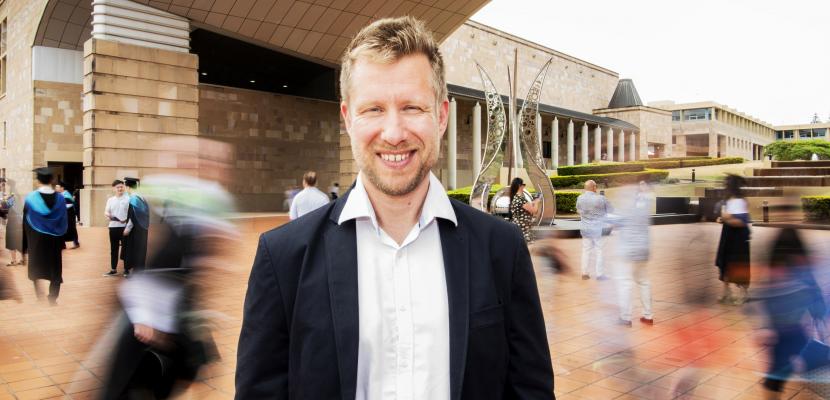
Assistant Professor Oliver Baumann has been leading a study examining how the brain's memory system works. PICTURE: Cavan Flynn
Have you ever run into a work colleague at the supermarket and failed to recognise them? Blame your brilliant, lazy brain.
A new study led by Assistant Professor Oliver Baumann of Bond University sheds fresh light on the way the body's most complex organ captures memories.
Researchers looked specifically at how the brain reacts when people encounter a person or object out of context for the first time.
Dr Baumann said that as we have only ever seen the co-worker at the office, the memory system appears to generate a snapshot that fuses the person and the office together.
“Our brain thinks that person belongs in that room,” Dr Baumann said.
“If you encounter them somewhere else, that creates a problem in that you might not recognise them.
“That doesn't happen once our brain learns the person exists independently of the room. Second time, third time around, our brain would not make that mistake again but encode the person and the room separately.”
Dr Baumann said the phenomenon indicates our brains are “intrinsically efficient or almost lazy”.
“If we see a tree and it's linked to a forest then it may be efficient to assume that not all the different trees and stones are separate entities but are coded as a unit.
“This ensures we are not overloading our brain and wasting space and energy.
“It is only when it seems beneficial to assume that an object or person could exist apart from the background that our brain takes the effort to encode that as an independent unit.”
In the study, students lying in an MRI brain scanner were asked to memorise multiple images of objects (such as a backpack, clock or cupcake) against backgrounds (including a gym, laundromat and garden).
Half of the objects had been shown to the students a day earlier. This made it possible to look at differences in brain responses when objects were familiar or had been encountered only once.
In the subsequent testing stage, researchers swapped the backgrounds of some objects and found this led to difficulty in remembering the unfamiliar objects.
The forgetfulness was accompanied by changes in activity in the hippocampus, one of the core human memory areas.
Dr Baumann said the findings provide insight into how our memory system strives for efficiency and only encodes what it absolutely needs.
“Forgetting can be seen as a feature because we shouldn't encode more than we need and more is not always better,” he said.
“People with Hyperthymesia remember almost everything in their life and while that seems like a neat feat, it comes with a downside because they have this huge mass of information present and it becomes very difficult to focus on a task.
“Forgetting helps declutter our mental space and it's all about efficiency.”
Dr Baumann said the research could be a small step towards brain implants that restore memory.
“We have retinal and cochlear implants now and maybe in 100, 200 years we could have memory implants and be able to artificially interface our memory system,” he said.
“This is one little building block in the endeavour to fully understand how our memory system works.”
The research was a collaboration between the School of Psychology and the Interdisciplinary Centre for the Artificial Mind at Bond University, the Queensland Brain Institute at the University of Queensland, and the Max Planck UCL Centre for Computational Psychiatry and Ageing Research.
It was published in the journal Frontiers in Psychology.
https://www.frontiersin.org/articles/10.3389/fpsyg.2020.591231/full